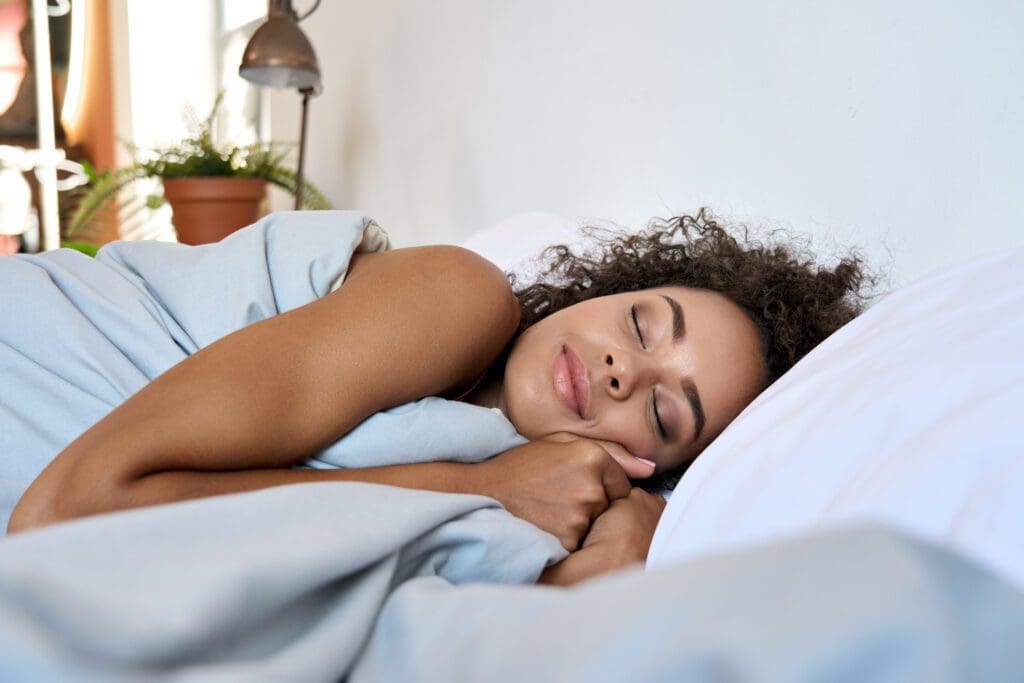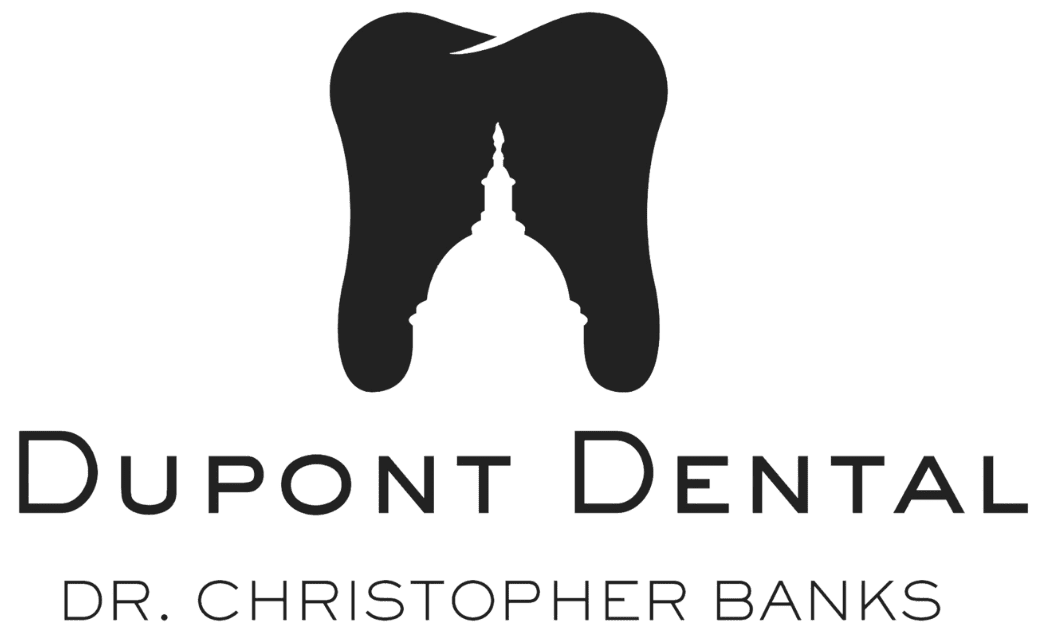Obstructive sleep apnea, or OSA, occurs when sleep positions relax tissues in the throat, obstructing the airway. Patients with sleep apnea can wake up multiple times, gasping for air at night. At Dupont Dental, we provide sleep apnea treatment for patients in Washington, DC. Addressing sleep apnea can restore patient comfort and open the airway, making breathing easier and improving sleep. Moreover, we provide restorative dentistry treatments in our Washington, DC, office.

Common Signs of Sleep Apnea
Other than pauses in breathing during sleep, sleep apnea patients can experience these symptoms:
- Snoring
- Falling asleep during the day
- Insomnia
- Waking up with a dry throat
- Changes in mood
- Morning headaches
- Dizziness when waking up
- A lack of energy during the day
Sleep apnea not only impacts your comfort at night. If you have sleep apnea, daytime sleepiness can also impact your life at work or school. You can even fall asleep when driving.
Risk factors for sleep apnea include excess weight, age, and gender. Patients who are male, over 40, or have excess weight may be more prone to sleep apnea.
Specifically, excess weight can lead to increased pressure on the airway. Age-related changes and male gender contribute to anatomical and hormonal factors that can worsen the condition. A naturally narrow airway or fat deposits can increase the risk of airway blockage.
When we identify these risk factors early it helps use provide prompt diagnosis. We can help manage your symptoms with sleep apnea treatment in our Washington, DC dentist office.
How You Get Diagnosed with Sleep Apnea
If you notice signs of sleep apnea, contact a sleep specialist for a sleep study. You can get a sleep study at a sleep clinic or at home with a portable monitoring device. During the study, the device will measure your breathing patterns, heart rate, and oxygen levels. It may also monitor limb movement and snoring.
A sleep study may be enough to determine if you have sleep apnea and if you have mild, moderate, or severe symptoms. If you have mild or moderate symptoms, you can visit our office for a custom sleep splint or appliance.
Sleep Apnea Treatment in Washington, DC
Continuous Positive Airway Pressure (CPAP) machines are the traditional treatment for patients with sleep apnea. These machines deliver oxygen through the airway, keeping it open so patients can breathe easier.
However, CPAP machines are bulky. They can be uncomfortable to wear and may feel claustrophobic for some patients. CPAP machines are also not easy to travel with or even move from room to room. We offer an alternative to CPAP machines.
Custom Oral Appliance
Dr. Banks works with sleep specialists to provide custom oral appliances. Once a specialist diagnoses you with sleep apnea, you can visit Dr. Banks for a consultation.
Dr. Banks will discuss your medical history, symptoms, and sleeping habits. He will also examine your mouth, throat, and airway. Dr. Banks will recommend an oral device if you have mild to moderate forms of sleep apnea.
You can get a custom appliance in just two visits. At your first visit, Dr. Banks will take impressions of your mouth. He will send these impressions to a lab, where technicians will create your custom appliance. Then, once the appliance is ready, you will return to our office.
Sleep apnea oral appliances cover the upper and lower teeth. They help open the airway by moving the lower jaw forward. Moving the lower jaw helps to prevent the tongue and soft tissues in the mouth from collapsing and blocking the airway.
This helps to maintain adequate airflow and prevent the pauses in breathing that are characteristic of sleep apnea. Wearing an oral appliance during sleep can help reduce your sleep apnea symptoms.
What Worsens Sleep Apnea?
Multiple factors can worsen symptoms of sleep apnea. While you receive sleep apnea treatment in our Washington, DC office, keep these factors in mind:
- Alcohol: Alcohol can relax your muscles, including the muscles in the throat and airway. In addition, alcohol can disrupt the body’s natural sleep cycle. It can reduce the amount of deep sleep you need.
- Sedatives: Certain medications that have a sedative effect relax the muscles in the throat. If you have sleep apnea, you must be careful with sedatives and use them under medical supervision.
- Nasal Congestion: When you’re congested, you find it harder to breathe through your nose. This can cause mouth breathing, which relaxes the throat muscles. If you’re congested, you also experience more pressure in the airways. As a result, it can be harder for air to flow in and out of your lungs.
- Sleep Position: The worst sleep position for sleep apnea is on your back. Sleeping on your back increases the risk of soft tissue collapse. Instead, sleep on your side or in a slightly elevated position.
Patient Review
Sleep Apnea FAQs
Discover more about sleep apnea in our Washington, DC, dental office with answers to these patient questions:
Can sleep apnea worsen heart problems?
Yes, sleep apnea can also worsen heart problems. Periods of apnea minimize the amount of oxygen that reaches the heart. Patients with heart problems are at an increased risk of these problems reoccurring if they have sleep apnea. These problems can include heart disease, heart attacks, or strokes.
Are snoring and sleep apnea the same?
No, snoring and sleep apnea are not the same. However, they are related. Snoring is the noise that occurs when relaxed tissue vibrate in the throat. It can occur at any age and isn’t necessarily a sign of a serious health problem. Still, it can disrupt sleep.
Sleep apnea is a serious sleep disorder where breathing repeatedly stops and starts during sleep. When the airway becomes blocked, it reduces airflow. It also reduces oxygen levels in the body.
While not all people who snore have sleep apnea, loud and persistent snoring can sometimes be a symptom of obstructive sleep apnea.
What role does weight play in sleep apnea?
People who are overweight or obese have a higher risk of developing this condition. This is because extra weight, especially around the neck, can put pressure on the airway. When you sleep, the muscles in your throat relax, and if there is extra weight around the neck, it can make the airway narrow or even close up, stopping your breathing for a short time.
Losing weight can sometimes help reduce sleep apnea symptoms or even prevent it. But not everyone with sleep apnea is overweight, and even thin people can have it.
Can sleep apnea lead to other health issues, like high blood pressure?
Yes, sleep apnea can lead to other health issues, including high blood pressure. When you have sleep apnea, your breathing stops and starts many times during the night. Each time this happens, your body doesn’t get enough oxygen, which puts stress on your heart and blood vessels. This can cause your blood pressure to rise.
Can sleep apnea affect my daytime energy levels?
Yes, when you aren’t getting enough oxygen during the night. This can lead to poor-quality sleep, even though you might be in bed for a full night. As a result, you may feel tired or drained during the day, even if you think you slept for a long time. This lack of energy can make it harder to concentrate, do your daily activities, or stay alert.
Is sleep apnea hereditary?
Yes, sleep apnea can be hereditary, which means it can run in families. If your parents or close family members have sleep apnea, you may have a higher chance of developing it too. This could be due to genetics, like having a naturally narrow airway or a large neck size, which can make it easier for the airway to get blocked during sleep.
Other things that may be passed down, like a tendency to gain weight, can also increase the risk of sleep apnea. However, not everyone with a family history will get sleep apnea, and lifestyle choices, like staying active and at a healthy weight, can help lower the risk.
Can children get sleep apnea?
Yes, children can get sleep apnea. The most common cause of sleep apnea in children is enlarged tonsils or adenoids (small tissue in the throat). Being overweight or having certain medical conditions can also cause pediatric sleep apnea.
What lifestyle choices can help me manage sleep apnea?
Several lifestyle choices can help you manage sleep apnea:
- Lose weight (if overweight) to reduce pressure on your airway.
- Sleep on your side to keep your airway open.
- Avoid alcohol and sedatives that relax the muscles in your throat.
- Quit smoking, which increases inflammation and fluid buildup in your airway.
- Go to bed and wake up at the same time every day.
In addition to professional sleep apnea treatment, these lifestyle changes can help reduce your symptoms.
Get a Good Night’s Sleep
Address sleep apnea symptoms today with a custom oral appliance. Call Dupont Dental for comfortable care at (202) 946-4720. You may also request a dental appointment with Dr. Banks online.
If you have questions about sleep apnea, please let us know at your next visit. We will be happy to help.
